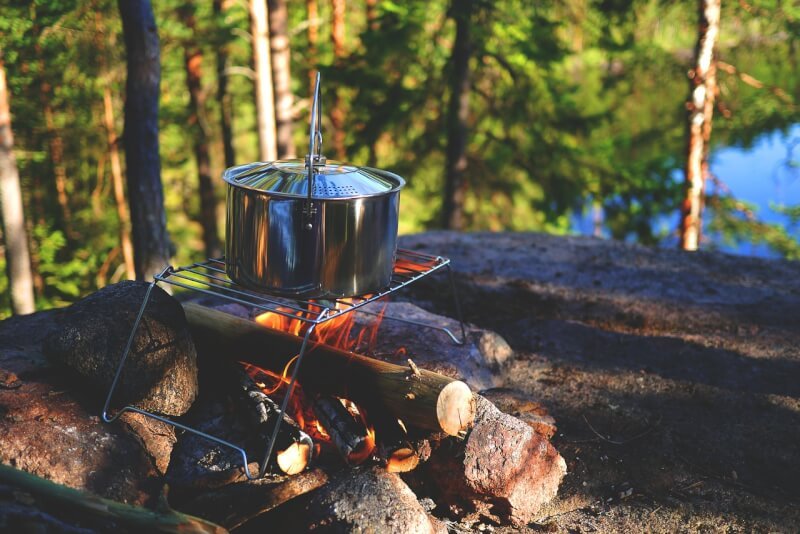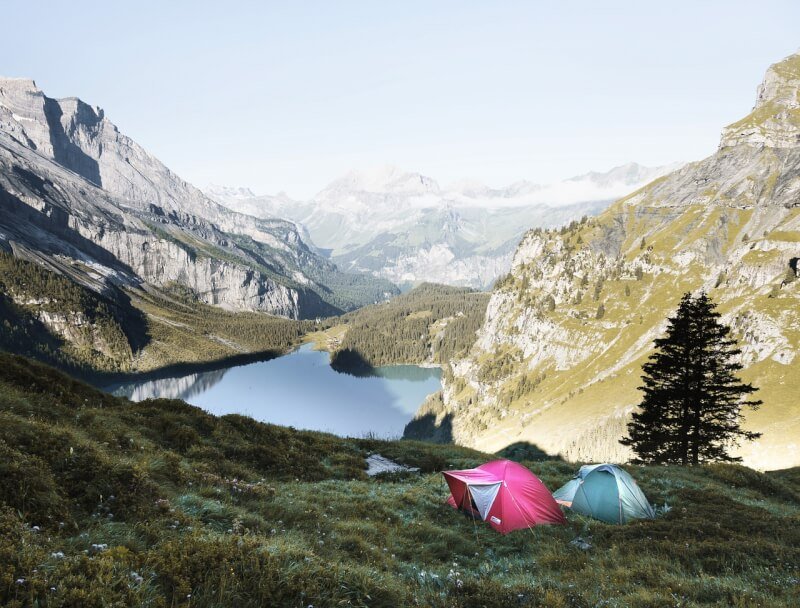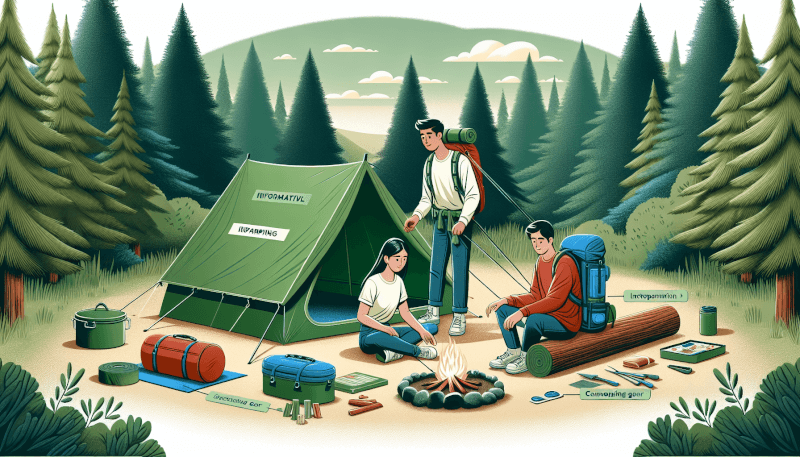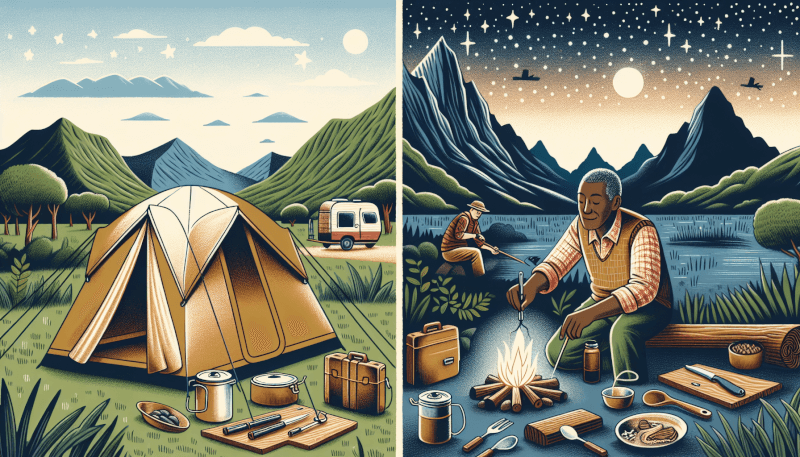Are you a beginner camper looking to explore the wonders of the great outdoors? Look no further! In this article, we have compiled a list of essential tips to help you navigate your way through your camping journey. From choosing the right gear to making a campfire, we’ve got you covered. So grab your backpack, lace up your hiking boots, and get ready to embark on an unforgettable adventure!
Choosing the Right Campsite
When it comes to choosing the right campsite, thorough research is key. You want to make sure you find a campsite that meets all your needs and preferences. Start by looking into different campsites in the area you are planning to visit. Read reviews and gather information about the facilities they offer, as well as their proximity to attractions and amenities.
Consider the location and accessibility of the campsite. Think about how far you are willing to travel and how remote of a location you would like your campsite to be. Are you looking for a serene and secluded spot in the wilderness, or do you prefer campsites with easy access to hiking trails, fishing lakes, or other recreational activities?
Find out about the amenities available at the campsite. Some campsites offer showers, restrooms, picnic tables, fire pits, and drinking water, while others may have more basic facilities. Think about what amenities are important to you and prioritize them accordingly.
Lastly, check if reservations are required for the campsite. During peak camping seasons, popular campsites may fill up quickly, so it is always a good idea to make a reservation in advance to secure your spot. Researching different campsites, considering the location and accessibility, finding out about the amenities available, and checking for reservation requirements will help you choose the right campsite for your outdoor adventure.
Essential Camping Gear
When it comes to camping, having the right gear can make all the difference in ensuring a successful and enjoyable trip. Here is a list of essential camping gear that you should consider bringing along:
Tents and sleeping bags are essential for a comfortable camping experience. Choose a tent that is appropriate for the size of your group and the expected weather conditions. Sleeping bags should be warm and cozy, providing insulation from the cold ground.
Cooking equipment and utensils are necessary for preparing meals outdoors. A portable stove or camping grill will allow you to cook delicious meals even in remote locations. Make sure to bring along pots, pans, utensils, and plates that are suitable for camping.
A firestarter and matches are essential for starting a campfire. Whether you need warmth, a cooking flame, or a cozy ambiance, a well-built fire will enhance your camping experience. Make sure to store matches in a waterproof container.
Flashlights and lanterns are indispensable for exploring the campsite at night and navigating in the dark. Choose reliable and durable lighting options that will provide adequate brightness.
A first aid kit is essential for dealing with minor injuries and ailments that may occur while camping. Make sure to include bandages, antiseptic ointments, pain relievers, and any necessary prescription medications.
Don’t forget to pack appropriate clothing and footwear for various weather conditions. Layering your clothing is recommended, as it allows you to adjust to temperature changes easily.
Having the right camping gear will ensure that you are well-prepared for any adventure in the great outdoors.

Packing for a Camping Trip
Packing for a camping trip requires careful planning and consideration. By following a few simple guidelines, you can ensure that you have everything you need without overpacking.
Make a checklist of all the items you will need for your camping trip. This will help you stay organized and ensure you don’t forget anything important. Divide your checklist into categories such as camping gear, clothing, food, and personal items.
When it comes to clothing, pack appropriate clothing for the weather you will encounter during your camping trip. Be prepared for changes in temperature and pack layers that you can easily add or remove as needed. Don’t forget to pack sturdy and comfortable footwear suitable for hiking and exploring the outdoors.
Bring enough food and water to sustain you throughout your camping trip. Pack non-perishable foods that are easy to prepare, such as canned goods, dried fruits, and granola bars. Remember to bring a sufficient supply of clean drinking water or invest in a portable water filtration system.
In addition to camping gear and clothing, don’t forget to pack camping essentials such as toiletries, sunscreen, insect repellent, and a camping chair. These items will enhance your comfort and make your camping experience more enjoyable.
When packing for a camping trip, it is important to pack light and smart. Avoid bringing unnecessary items or duplicates. Consider the weight and bulkiness of each item and aim to pack efficiently to make transportation and setup easier.
By making a checklist, packing appropriate clothing for the weather, bringing enough food and water, not forgetting camping essentials, and packing light and smart, you will be well-prepared for your camping trip.
Setting Up Camp
Setting up camp is an important part of the camping experience. By following a few simple steps, you can ensure that your campsite is comfortable, safe, and organized.
Start by choosing a flat and dry area for your campsite. Look for an area that is free of rocks and debris to ensure a comfortable sleeping surface. Avoid setting up camp in low-lying areas that may become flooded in case of rain.
Clear the ground from rocks, twigs, and other debris before pitching your tent. This will help prevent damage to the tent floor and ensure a more comfortable camping experience.
Pitch the tent properly according to the manufacturer’s instructions. Make sure all poles are securely in place and that the tent is tightly stretched to prevent water leakage. Use tent stakes to secure the tent to the ground and add guylines if necessary for added stability.
Set up a campfire area away from the tent and other flammable materials. Clear the area around the fire pit from dry leaves and twigs to reduce the risk of accidental fires. Follow local fire safety regulations and always keep a bucket of water nearby in case of emergencies.
Organize your campsite by setting up designated areas for cooking, eating, and storing your camping gear. Keep cooking and food storage areas separate from your sleeping area to minimize the risk of attracting animals. Use waterproof containers or bear-resistant canisters to store your food securely and prevent wildlife encounters.
By choosing a flat and dry area, clearing the ground from rocks and debris, pitching the tent properly, setting up a campfire area, and organizing your campsite, you will create a comfortable and functional camping setup.

Campfire Safety
A campfire can be the centerpiece of a memorable camping trip, providing warmth, light, and a cozy atmosphere. However, it is important to prioritize campfire safety to prevent accidents and wildfires.
Before starting a campfire, check for any fire restrictions in the area you are camping. Some areas may have bans on open fires due to dry conditions or high fire risk. It is crucial to respect these regulations to protect the environment and ensure everyone’s safety.
When choosing a location for your campfire, keep a safe distance from flammable materials such as dry grass, shrubs, or overhanging branches. Clear the area around the fire pit from any debris that could catch fire and ensure there is a sufficient clearance around the fire.
Never leave the campfire unattended. Assign a responsible adult to monitor the fire at all times. This will help prevent accidents and ensure that the fire remains under control.
Extinguish the fire completely before leaving the campsite or going to bed. Pour water on the fire, making sure to douse all embers and coals. Mix the ashes with soil to further smother any remaining heat. Use a shovel or stick to stir the ashes and check for any remaining hot spots.
Dispose of ashes properly by scattering them in a designated fire pit or ash disposal site. Do not scatter ashes in the wilderness or put them in plastic bags, as they can retain heat and cause fires.
By checking for fire restrictions, keeping a safe distance from flammable materials, never leaving the fire unattended, extinguishing the fire completely, and disposing of ashes properly, you can enjoy a safe and responsible campfire experience.
Food and Meal Preparation
Proper food and meal preparation are essential for a successful camping trip. By planning ahead and following a few guidelines, you can enjoy delicious meals in the great outdoors.
Plan your meals in advance and make a detailed shopping list. Taking the time to plan your meals will ensure that you have all the necessary ingredients and avoid last-minute trips to the store.
When it comes to food, choose non-perishable and easy-to-cook options that require minimal preparation. Canned goods, dried fruits, nuts, and granola bars are excellent choices for camping trips. Consider investing in a cooler to store perishable items such as meat, dairy products, and fresh produce.
Store food securely to prevent wildlife encounters. Animals are attracted to the smell of food, so it is important to keep your campsite clean and free of food debris. Use bear-resistant canisters or hang food bags from a tree branch in a bear bag to keep your food safe from animals.
Prepare meals using a campfire or portable stove. Cooking over an open flame can be a fun and enjoyable experience, but it requires some planning and preparation. Make sure to bring suitable cookware, utensils, and fuel for your cooking method.
Clean up thoroughly after every meal to minimize the risk of attracting animals and to leave no trace of your presence. Remember to dispose of food waste properly in designated trash containers or pack it out if necessary.
By planning meals in advance, bringing non-perishable and easy-to-cook foods, storing food securely, preparing meals using a campfire or portable stove, and cleaning up thoroughly, you can enjoy delicious meals while minimizing the impact on the environment.

Bathroom and Hygiene
Maintaining proper hygiene and using campground facilities responsibly are essential for a comfortable and enjoyable camping trip. Here are some tips to help you stay clean and respect the environment.
Locate and use the campground facilities for bathroom needs whenever possible. Most campgrounds have restrooms or toilet facilities that are regularly maintained. Make sure to bring toilet paper and hand sanitizer in case these amenities are not available.
Bring personal hygiene items such as toothbrushes, toothpaste, soap, and towels. These items are essential for maintaining cleanliness during your camping trip.
Practice Leave No Trace principles by minimizing your impact on the environment. Avoid washing dishes or personal items in lakes, rivers, or streams. Use biodegradable soap when cleaning and dispose of wastewater at least 200 feet away from water sources.
Dispose of waste properly by using designated trash containers provided by the campground. Pack out what you pack in and avoid leaving any trash behind. This will help keep the camping area clean and minimize the risk of attracting wildlife.
By locating and using campground facilities, bringing personal hygiene items, practicing Leave No Trace principles, disposing of waste properly, and packing out what you pack in, you can maintain good hygiene and minimize your impact on the environment.
Exploring the Surroundings
Exploring the surroundings is one of the highlights of any camping trip. By planning ahead and following a few guidelines, you can make the most of your outdoor adventures.
Plan outdoor activities ahead of time to ensure that you don’t miss out on any attractions or opportunities. Research local hiking trails, fishing spots, or other recreational activities, and make a list of places you would like to visit.
Study maps and trails to familiarize yourself with the area and plan your routes accordingly. This will help you navigate the surroundings more efficiently and reduce the risk of getting lost.
Follow trail markers and signs to stay on designated paths and avoid wandering into restricted or sensitive areas. Respect any closures or warnings related to wildlife or environmental conditions.
Observe wildlife from a safe distance and never approach or feed wild animals. Admiring wildlife is a wonderful part of the outdoor experience, but it is important to respect their natural habitat and maintain a safe distance to minimize any potential conflicts.
Leave nature undisturbed by practicing the principles of Leave No Trace. Avoid picking flowers, disturbing rocks or vegetation, or leaving any traces of your presence. This will help preserve the natural beauty and integrity of the area for future generations.
By planning outdoor activities ahead of time, studying maps and trails, following trail markers and signs, observing wildlife from a safe distance, and leaving nature undisturbed, you can fully enjoy and appreciate the beauty of the surroundings during your camping trip.

Dealing with the Weather
The weather can have a significant impact on your camping experience. Being prepared and staying informed about weather conditions will help you stay safe and comfortable during your outdoor adventure.
Check the weather forecast regularly before and during your camping trip. Pay attention to any warnings or advisories issued by local authorities. This will help you anticipate any potential changes in weather and plan accordingly.
Pack appropriate clothing and gear for the expected weather conditions. Be prepared for changes in temperature, rainfall, or wind by bringing layers of clothing that can be easily added or removed. Ensure that your camping gear is suitable for different weather conditions.
Stay updated on weather conditions by tuning in to local weather reports or downloading weather apps on your phone. This will allow you to make informed decisions and adjust your plans if necessary.
Take shelter during storms to protect yourself from potential hazards such as lightning or heavy rain. Seek refuge in your vehicle, tent, or a designated shelter until the storm passes.
Be prepared for unexpected changes in weather. Even if the forecast predicts sunny weather, always bring rain gear and extra layers of clothing to stay warm and dry in case of sudden temperature drops or rain showers.
By checking the weather forecast, packing appropriate clothing and gear, staying updated on weather conditions, taking shelter during storms, and being prepared for unexpected changes, you can navigate the weather successfully during your camping trip.
Staying Safe in the Outdoors
Safety should always be a top priority when camping in the great outdoors. By following a few basic guidelines, you can ensure a safe and enjoyable camping experience.
Inform others about your camping plans before you leave. Share your itinerary, including the campsite location, expected duration of your trip, and any planned activities. This will help others know where to find you in case of an emergency.
Keep emergency contact information readily available. Make sure you have the phone numbers of local emergency services, park rangers, and the campground office. Store this information in your phone or write it down and keep it in a safe place.
Know basic first aid and bring a well-stocked first aid kit. Be familiar with common injuries and ailments that can occur during camping trips and know how to treat them. Take a basic first aid and CPR course to enhance your skills and confidence in handling emergencies.
Stay aware of your surroundings at all times. Be mindful of potential hazards such as steep drops, slippery surfaces, or venomous animals. Keep an eye out for signs of changing weather conditions or approaching storms.
Trust your instincts and practice situational awareness. If something doesn’t feel right or looks unsafe, it is usually best to err on the side of caution. Stay within your comfort zone and avoid taking unnecessary risks.
By informing others about your camping plans, keeping emergency contact information, knowing basic first aid, staying aware of your surroundings, and trusting your instincts, you can ensure a safe and enjoyable experience while camping in the great outdoors.
Remember, camping is a wonderful way to connect with nature and create cherished memories. By following these tips and guidelines, you will be well-prepared to navigate the great outdoors and have a fantastic camping experience. Happy camping!



